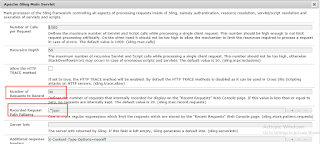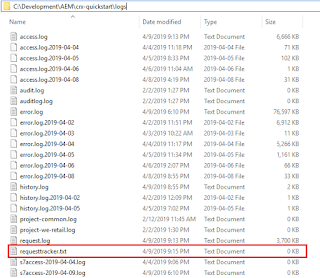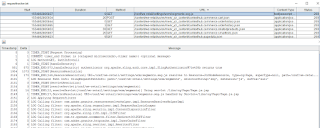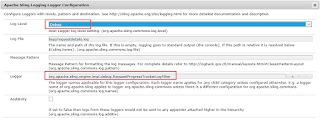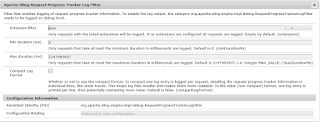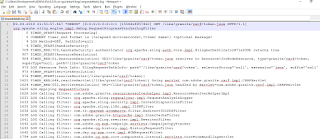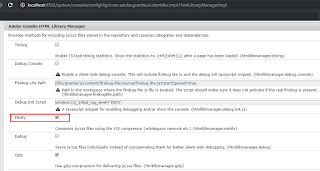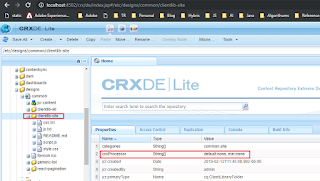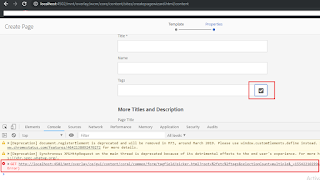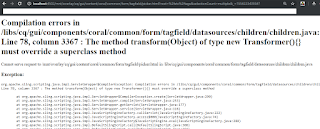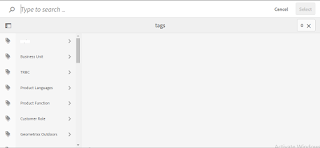Not Found (404) - The requested URL /siteadmin resulted in an error in org.apache.sling.servlets.get.DefaultGetServlet.
In one of our AEM(Adobe Experience Manager) environment recently we were facing 404 issue for all standard URL's like siteadmin, useradmin, welcome.html etc and for the custom content URLs.
The below message has been displayed in the browser while accessing the pages.
Not Found (404)
The requested URL /siteadmin resulted in an error in org.apache.sling.servlets.get.DefaultGetServlet.
Request Progress:
0 TIMER_START{Request Processing}
0 COMMENT timer_end format is {<elapsed microseconds>,<timer name>} <optional message>
3 LOG Method=GET, PathInfo=null
4 TIMER_START{handleSecurity}
3166 TIMER_END{3160,handleSecurity} authenticator org.apache.sling.auth.core.impl.SlingAuthenticator@1444cb1f returns true
3344 TIMER_START{ResourceResolution}
3438 TIMER_END{93,ResourceResolution} URI=/siteadmin resolves to Resource=JcrNodeResource, type=cq/ui/components/widget, superType=null, path=/apps/wcm/core/content/siteadmin
3443 LOG Resource Path Info: SlingRequestPathInfo: path='/apps/wcm/core/content/siteadmin', selectorString='null', extension='html', suffix='null'
3443 TIMER_START{ServletResolution}
3446 TIMER_START{resolveServlet(/apps/wcm/core/content/siteadmin)}
3455 TIMER_END{8,resolveServlet(/apps/wcm/core/content/siteadmin)} Using servlet org.apache.sling.servlets.get.DefaultGetServlet
3457 TIMER_END{14,ServletResolution} URI=/siteadmin handled by Servlet=org.apache.sling.servlets.get.DefaultGetServlet
3459 LOG Applying Requestfilters
3463 LOG Calling filter: com.adobe.granite.resourceresolverhelper.impl.ResourceResolverHelperImpl
3469 LOG Calling filter: org.apache.sling.security.impl.ContentDispositionFilter
3472 LOG Calling filter: org.apache.sling.i18n.impl.I18NFilter
3476 LOG Calling filter: com.adobe.granite.httpcache.impl.InnerCacheFilter
3481 LOG Calling filter: org.apache.sling.rewriter.impl.RewriterFilter
3484 LOG Calling filter: com.adobe.cq.mcm.campaign.servlets.CampaignCopyTracker
3486 LOG Calling filter: com.day.cq.wcm.core.impl.WCMRequestFilter
3489 LOG Calling filter: com.adobe.cq.wcm.core.components.internal.servlets.CoreFormHandlingServlet
3491 LOG Calling filter: com.adobe.granite.optout.impl.OptOutFilter
3496 LOG Calling filter: com.day.cq.wcm.foundation.forms.impl.FormsHandlingServlet
3498 LOG Calling filter: com.adobe.cq.social.commons.cors.CORSAuthenticationFilter
3500 LOG Calling filter: org.apache.sling.engine.impl.debug.RequestProgressTrackerLogFilter
3513 LOG Calling filter: com.day.cq.wcm.mobile.core.impl.redirect.RedirectFilter
3515 LOG Calling filter: com.day.cq.wcm.core.impl.AuthoringUIModeServiceImpl
3518 LOG Calling filter: com.adobe.granite.csrf.impl.CSRFFilter
3522 LOG Calling filter: com.adobe.granite.rest.assets.impl.AssetContentDispositionFilter
3525 LOG Calling filter: com.adobe.granite.requests.logging.impl.RequestLoggerImpl
3528 LOG Calling filter: com.adobe.granite.rest.impl.servlet.ApiResourceFilter
3822 LOG Calling filter: com.adobe.cq.social.ugcbase.security.impl.SaferSlingPostServlet
3826 LOG Calling filter: com.day.cq.dam.core.impl.assetlinkshare.AdhocAssetShareAuthHandler
3831 LOG Calling filter: com.day.cq.dam.core.impl.servlet.ActivityRecordHandler
3839 LOG Applying Componentfilters
3841 LOG Calling filter: com.day.cq.personalization.impl.TargetComponentFilter
3844 LOG Calling filter: com.day.cq.wcm.core.impl.PageLockFilter
3846 LOG Calling filter: com.day.cq.wcm.core.impl.WCMComponentFilter
3958 LOG Calling filter: com.day.cq.wcm.core.impl.WCMDebugFilter
3962 TIMER_START{org.apache.sling.servlets.get.DefaultGetServlet#0}
3966 LOG No renderer for extension html
3970 LOG Applying Error filters
3970 LOG Calling filter: org.apache.sling.i18n.impl.I18NFilter
3971 LOG Calling filter: org.apache.sling.rewriter.impl.RewriterFilter
3973 TIMER_START{handleError:status=404}
4138 TIMER_END{163,handleError:status=404} Using handler org.apache.sling.servlets.resolver.internal.defaults.DefaultErrorHandlerServlet
5244 LOG Found processor for post processing ProcessorConfiguration: {contentTypes=[text/html], order=-1, active=true, valid=true, processErrorResponse=true, pipeline=(generator=Config(type=htmlparser, config={}), transformers=(Config(type=linkchecker, config={}), Config(type=mobile, config=JcrPropertyMap [node=Node[NodeDelegate{tree=/libs/cq/config/rewriter/default/transformer-mobile: { jcr:primaryType = nt:unstructured, component-optional = true}}], values={jcr:primaryType=nt:unstructured, component-optional=true}]), Config(type=mobiledebug, config=JcrPropertyMap [node=Node[NodeDelegate{tree=/libs/cq/config/rewriter/default/transformer-mobiledebug: { jcr:primaryType = nt:unstructured, component-optional = true}}], values={jcr:primaryType=nt:unstructured, component-optional=true}]), Config(type=contentsync, config=JcrPropertyMap [node=Node[NodeDelegate{tree=/libs/cq/config/rewriter/default/transformer-contentsync: { jcr:primaryType = nt:unstructured, component-optional = true}}], values={jcr:primaryType=nt:unstructured, component-optional=true}]), serializer=Config(type=htmlwriter, config={}))}
5340 TIMER_END{5339,Request Processing} Dumping SlingRequestProgressTracker Entries
The trace says org.apache.sling.servlets.get.DefaultGetServlet is used to render the response instead of specific one in this case it should heave been /libs/cq/ui/components/widget/html.jsp - this was the case for all the pages, default servlet were used for rendering the response.
3455 TIMER_END{8,resolveServlet(/apps/wcm/core/content/siteadmin)} Using servlet org.apache.sling.servlets.get.DefaultGetServlet
Based on the analysis
- All the bundles were active
- CRXDE and system console were accessible with out any issue
- There was no recent configuration changes or code deployment
- All the standard configurations were looking fine
Unfortunately we were not able to identify the root cause, it looks to be the server was not started completely last time. The issue got resolved after restarting the server.


